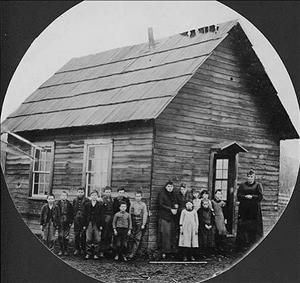On December 31, 1912, the community of Tolt in eastern King County incorporates as a town of the fourth class. The town will alternate between the names Tolt and Carnation three times over the next 40 years before finally sticking with Carnation in 1951. Carnation is located approximately 20 air miles east of Seattle (closer to 30 miles by car) in the attractive and fertile Snoqualmie Valley, and is home to the renowned Carnation Farms. Even in the late 2010s, the city retains a small-town, rural atmosphere despite its proximity to Seattle.
Beginnings
The future site of Tolt, located at the junction of the Tolt and Snoqualmie rivers near the Cascade foothills in eastern King County, was the main village site for the Snoqualmie Tribe for thousands of years. The tribe ceded the site and the surrounding valley to the United States in 1855 as part of the Treaty of Point Elliott. James Entwistle (1832-1902) was the first non-Native settler, filing a homestead claim for 160 acres near the confluence of the Tolt and Snoqualmie rivers in 1858 and settling on the site permanently with his family in 1861. Entwistle, who had earlier deserted from the U.S. Army at Fort Steilacoom, rebuilt his reputation during his years in Tolt. He established a trading post, later successfully tried his hand at hop farming, and was highly regarded in the community by the time of his death in 1902.
The community's first school (a log shack) was built in 1879, and Tolt's first post office opened in 1883. By the end of the nineteenth century there was a better school building, a church, a social club, a general store, and a few houses, which were primarily built from logs chinked with moss. Still, the community was simply that, a community, and had not yet grown enough to organize itself into a town. That changed when Tolt was platted on May 6, 1902. This helped pave the way for further growth and eventually led to the filing of an incorporation petition on December 3, 1912, requesting that Tolt be incorporated as a town of the fourth class.
An election followed on Christmas Eve, 1912, and the votes were counted on December 30. Incorporation passed with a vote of 108 yes to 71 no. Tolt's first mayor was C. E. Sorenson, who defeated O. P. Hanson by a vote of 95-90. The first five town council members were John Bird, William Ince, Charles Knecht, A. H. Lemon, and A. J. McDonald. The King County Board of County Commissioners wasted no time getting the appropriate documents down to the secretary of state's office in Olympia for filing, and Tolt's incorporation became official on the following day, December 31, 1912.
By Any Other Name ...
In 1908 Elbridge Stuart created Carnation Farms on 360 acres of farmland located approximately two miles northwest of the Tolt community, and it quickly grew into one of the premier dairy farms in the region. Working under the philosophy that happy, well-treated cows produced more milk, the farm became known as "the home of contented cows." It became so well known that it was an occasional stopover for famous visitors to Seattle, including Jack Dempsey and Mickey Rooney. The farm later changed its focus from milk production to cattle breeding, and then genetics research, before it was sold to Nestle in 1985. In 2010 the Stuart family repurchased the farm, and by 2018 it had become a far more diverse operation than it was during its earlier years. In addition to cattle, the farm now had an eight-acre organic garden, beehives, 16 different breeds of chickens, and even its own water-treatment facility. The farm also offered a two-mile hiking trail, with plans to open five more miles.
Five years after Tolt's 1912 incorporation, townfolks in 1917 began calling for it to be renamed Carnation in honor of the farm. The new name quickly proved to be controversial. The problem wasn't the name itself or its connection with the farm, but that Tolt was the name (or an approximation of the name) by which the area had been known for millennia by the Native Americans who lived there, and the town’s early settlers had also adopted that name. There was strong sentiment that it should be kept. Transient loggers and railroad-boarding-house residents had been allowed to sign the petition requesting the change to "Carnation" (which was finalized by the legislature), further irking longtime Tolt residents, who argued the transients weren't interested in the town's history.
It became such a brouhaha that in 1928 the town changed its name back to Tolt, but instead of solving the problem, it only added to the confusion. During the 1930s and 1940s maps of the area used both names, while the railroad depot and the post office simply retained the Carnation appellation. Finally, in 1951 the town formally changed its name back to Carnation, more or less ending the saga, although the name Tolt retains its prominent place in the city's history.

